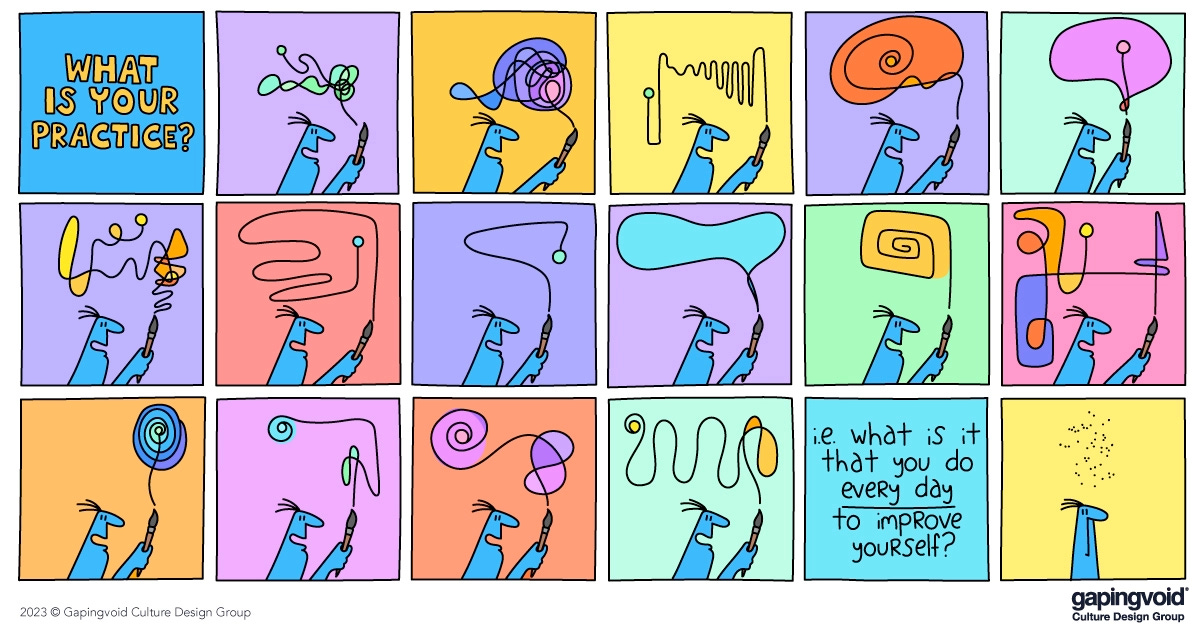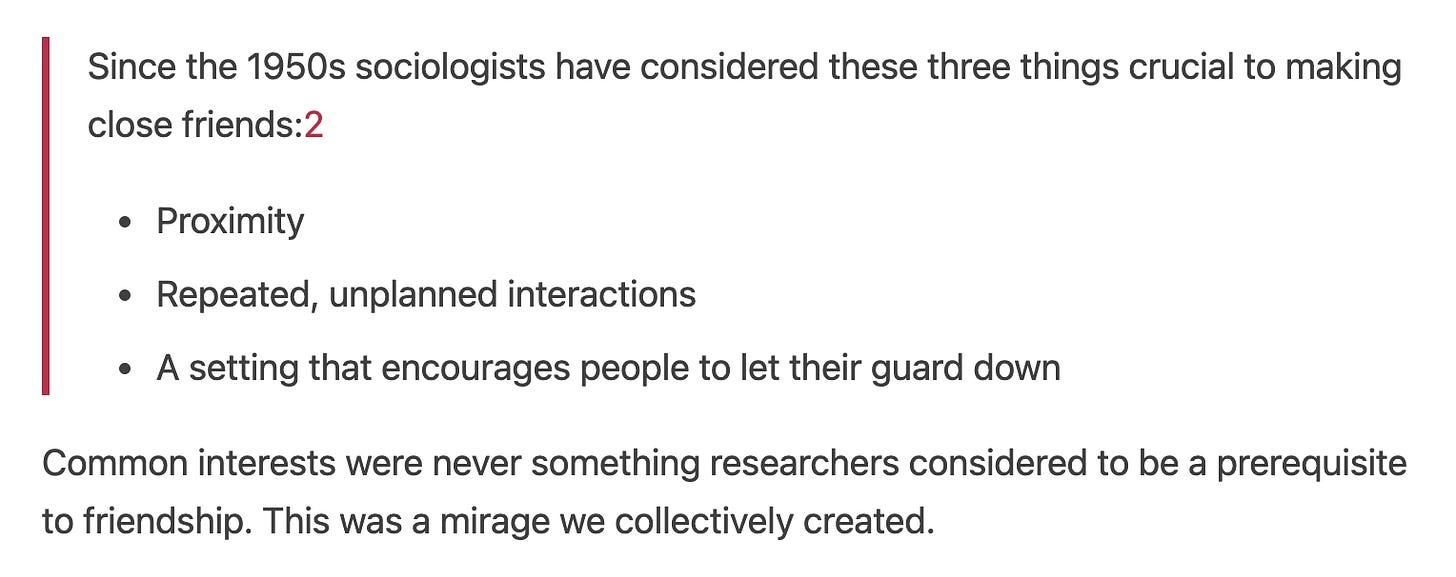💬 Simplicity is about subtracting the obvious and adding the meaningful
Your weekly dose of new ideas & inspirations
Hey, Pritesh here.
We’ve reached post #102 in this journey of discovering new ideas & inspirations.
Here’s a quick glance of today’s post:
📻 Change the way you work
👁️🗨️ A short course of visual thinking
🪄 Make something wonderful
🧑🤝🧑 How to make friends as adults
And much more…
If you enjoy reading “Stay Curious”, show your love by ❤️’ing it or leaving a comment or sharing it with a couple of your friends. Any support is highly appreciated.
And with that, let’s dive in.
1. Change the way you work
If you’re an operator and org builder, The Knowledge Project podcast episode with Aaron Dignan is one of the best investments you can do today. This 80 minute conversation is filled with so many gems that I can dedicate the full post to him and still leave a lot of goodness untouched.
Here’re my key takeaways from the post (highly curated & edited excerpts to keep the length of this post manageable).
On effective feedback systems
Your distance from feedback also separates you from reality, and if you’re separated from reality, you can’t touch it, you can’t feel it, you can’t try things. The more people between you and the feedback or the more time between you and the feedback, you create problems.
How feedback is necessary for progress
So whatever your principles, whatever your values are, whatever you care about, whatever winning means to you, you’re going to steer in the direction of that based on the input that you get.
Difference between complicated and complex
The complicated context is the engine of a car or a watch, it is predictable, there’s cause and effect inside it. The parts fit in a way that if you’re an expert, you kind of know how to take it apart and put it back together again. So if there’s a problem, it can be solved and it can be delivered and it can be working again, no problem. There’s very high confidence in solutioning, in those areas.
In a complex system, which would be weather or traffic or gardens or six-year-olds, they are dispositional, so they have an attitude away, they’re trending, but you can’t fundamentally predict them. You can’t be sure what’ll happen if you try something, and if you bring that complicated approach, the checklist, the Gantt chart, the quarterly goals, the objectives, the management to that context, you tend to really struggle and fail.
How to build culture & instil values in your organization
When you’re speaking constantly about these are our values and they’re so important. Integrity, integrity. That’s a clue that something is going on that’s not healthy, when in fact good change and good patterns and culture are quite fluid. So it should be moving effortlessly and behaviorally through the culture, through modeling and through storytelling, not through the poster with the five pillars.
On standards and defaults
Yeah, so a standard is the idea that we’ve all agreed that this is kind of the bar. This is the way we’re going to do it. You could replace that with the word policy or procedure or bright red line, red tape, whatever. The standard is basically saying, this is it, this is the only way. So, you expect people to comply. A default says, “If you don’t know, better try this.” So a default would be like, if we’re doing a workshop, the default agenda is this and then this, and then that, so that’s the default agenda.
Some quotes worth remembering:
The young man knows the rules, the old man knows the exceptions.
So a camel is a horse designed by committee. I
A rituals worth trying out: Check-in round in team meetings
Some ideas to further deep dive on:
Scarring on the first cut (Jason Fried)
Shu Ha Ri (a Japanese idea in terms of a ladder of mastery)
Culture of consensus vs consent
Permission culture vs constraint culture
Thank you Rout for helping on the transcript of this one.
2. What is your practice?
This one is a stunner by Gapingvoid.
A “practice” is a Buddhist idea of something you do every day to improve yourself spiritually. A meditation practice, a prayer practice, a yoga practice, etc. But it doesn’t have to stop there. You can have a writing practice, a knitting practice, a jogging practice, a coffee roasting practice, so long as it's deliberate and disciplined.
And the real beauty is, it doesn’t really matter what the “it” is, so long as a) it captivates your soul and b) you keep at it.
Thank you Garima for getting me started on them again.
3. Visual thinking
I’m one of those who always ‘believed’ that I cannot draw. And I know, I am not alone in this struggle.
Dave Gray’s short course on Visual thinking is just the right remedy for this. This post directly spoke to me and now I am on my way to prove myself wrong!
You will need to spend just about an hour of time & attention. Check out his post or at least try to give this 5 min fun exercise a quick try. It’s that simple.
(via Design Vitamins)
4. Make Something Wonderful
I generally don’t cover the most popular and trending material. These things find their way to you through many sources.
However, I’m taking an exception for the latest Free Ebook that Steve Jobs Archive has published. “Make Something Wonderful” is a fantastic read, worth every minute of your time. It shares a lot of Steve’s notes & email threads - almost making us hear things directly from him. The format feels like the “Top of the mind”conversation that I have found super useful in making a connection.
I’ve read so many different write ups about Steve Jobs, but this one stands out amongst all of them.
And here’s my little moment of joy from the ebook.
5. How to make friends
If you feel that common hobbies and interests are the starting point for making new friends, then you need to read Zac Solomon’s post on “How to make friends as an adult”. Here’s why:
Really useful suggestions, and none of them require you to do something crazy!
(via Brainpint by Janel)
6. Light reads
Some interesting posts & essays that are well worth reading.
The storytelling power of simple design solutions.
Business lessons from Taylor Swift. This is not your regular LinkedIn cringe post. Read it to know more about Taylor Swift’s genius if not for the management gyan.
Coffee cup Lids by Phil Patton. Art of noticing is such a gift, it can keep you discovering new joy every moment.
Pricing cannot be “figured out later,” because it determines your business model today.
What if Willy Wonka was a video game designer? A quick primer on the process of Syncretism and how you can create a better matrix by collecting more dots.
7. Everything else
Some random goodness from the internet:
The price of a Harvard Lawyer. How corporates intrude the campus & student life to capture the future recruits.
Secret undo codes for Japanese elevator floor buttons. Japanese design thinking never fails to surprise. Some of these work in Indian elevators as well, by the way.
Bitcoin Whitepaper hidden inside your MacOS. Some sort of Easter egg? (via Benedict’s newsletter)
The title of today’s post is a quote by John Maeda. I discovered it in the storytelling power of simple design solutions.
Before we sign off, here’s a quick poll for you. Pls do share your feedback, it helps make this newsletter better.
That's all for this week, folks!
I hope I've earned the privilege of your time.
If you enjoyed this post, show your love by ❤️’ing it or leaving a comment or sharing it with a couple of your friends.







